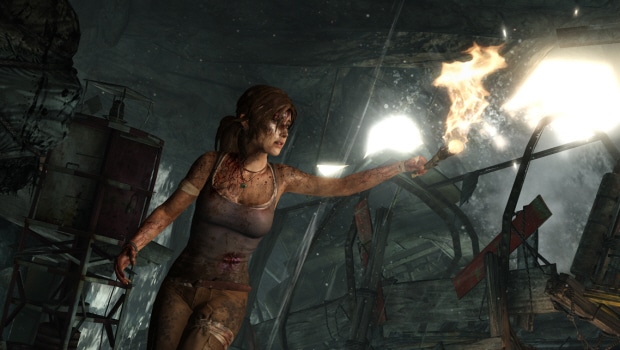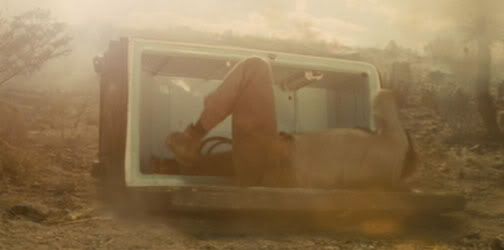"When people play Lara, they don't really project themselves into the character," Rosenberg told me at E3 last week when I asked if it was difficult to develop for a female protagonist.Here are some more in depth articles if you can stomach it, 1) the Kotaku article that the quotes are from and 2) a solid post by Chuck Wendig about just how amazingly troubling this is as a storyteller.
"They're more like 'I want to protect her.' There's this sort of dynamic of 'I'm going to this adventure with her and trying to protect her.'"
So is she still the hero? I asked Rosenberg if we should expect to look at Lara a little bit differently than we have in the past.
"She's definitely the hero but— you're kind of like her helper," he said. "When you see her have to face these challenges, you start to root for her in a way that you might not root for a male character."
 |
| Hurray for Realism, amiright? |
You may take note of her new "less curvy" figure and say, hey, she's slightly more realistically visualized, isn't that a win? Maybe. Humanizing her to human proportions physically does not solve a poorly drawn narrative. According to their own spokesman, "humanizing" means "much less capable" when building a female character at Square Enix.
Recently it seems that if you intend to reboot a female character, especially in console video games, we have seen one major failure to communicate, Metroid: Other M. And in many ways, both of these reboots fall prey to the idea the same oversimplifications that a "strong character" must be super heroically overpowered. Strength does not simply refer to physical strength or powers, it also, more poignantly can mean resilience or resolve in the face of adversity.
...a person could be strong like Superman in the sense that he could lift a heavy object, or he could be strong like John McClain in the sense that he’ll keep fighting no matter what, or he could just be rendered strongly: that is, this is just a clearly and boldly defined, precise and complex character.In this case, the oversimplification is that for Lara Croft to be a 'real woman'; she must be significantly more vulnerable, not simply drawn to human proportions. To enjoy a story with a "real woman" in it, players must also fall into a white night stereotype of damsel saving, rather than say, exploring and raiding tombs. Like Iron Men on The Weather Channel and Parking Wars on A&E (Arts and Entertainment by the way) it seems that we've forgotten the core reason people sought out the experience in the first place.
 |
| Pictured: Archeology. |
Take careful note that no male player would ever enjoy playing Lara Croft and identify with her as a heroine, or want her to succeed despite her femaleness (despite the games and movies to suggest the contrary). The implicit understanding here is that the players of the game ONLY want to play Tomb Raider because they want to dominate a female sex object, in the form of Lara Croft. That is troublingly sexist toward the male players in all honestly. They wouldn't possibly enjoy the Tomb Raider series because it had fun gameplay, or interesting challenges or tolerable writing, it is such a wild mystery why a game series starring a woman would continue to be successful over time that it must be because gamers are sex starved and obsessed with dominating a female avatar.
Let's not even pretend like it occurred to the game makers that women also play these games or might have wanted to, they clearly have no intention of developing or reaching that audience. It is hardly surprising that Tropes vs. Women in Video Games has gotten traction on Kickstarter is that the offensive tropes built into games aren't serving anyone's needs. Not creatively, financially or as experiences.
 |
| Pictured: Also Archeology, at least there's a torch? |
In the new Tomb Raider, Lara Croft will suffer. Her best friend will be kidnapped. She'll get taken prisoner by island scavengers. And then, Rosenberg says, those scavengers will try to rape her.THESE ARE WORDS THAT CAME OUT OF A PERSON PROMOTING THE GAME FOR SALES' MOUTH.
"She is literally turned into a cornered animal," Rosenberg said. "It's a huge step in her evolution: she's forced to either fight back or die."
To humanize Lara Croft she must become a CORNERED ANIMAL. In order to have a compelling origin story, a hugely wealthy archaeologist must fight off a bunch of savage rapists and become hardened against the world. They're doing this for shock value you say, the desire is to be shocking?
"We're not trying to be over the top, shock people for shock's sake," he said. "We're trying to tell a great origin story."As in Comic Books, Lara Croft is getting fridged.
Old Lara, while absurdly proportioned, was a super heroine, and frankly, we don't treat our male superheroes or male explorer characters this way. Did Uncharted reduce Nate to his most vulnerable in order to reboot the franchise with a great origin story? No.
The most popular explorer of our times fictionally is Indiana Jones, and sure, he's fictionalized, idealized and yes, he too spends some time in a fridge. But you can Nuke that Fridge and he'll get up again.
Will the Video Game industry ever understand why its treatment of female characters is infuriating to so many people? And what would be more depressing, if this Tomb Raider Reboot continued to show a female character who must be sexualized as a victim to succeed or for the most famous female character in video games to fade into nothingness?



UUUUUUUUUUUUUUUUUGGGGGGGGGGGGGGGGGGGGHHHHHHHHHHHHHHHHHHHHHHHHHHHHHHHHHH
ReplyDelete